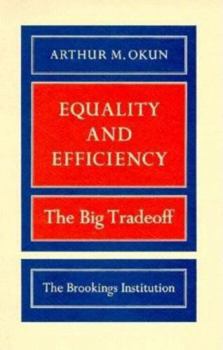Equality and Efficiency: The Big Tradeoff
Select Format
Select Condition 
Book Overview
" Contemporary American society has the look of a split-level structure. Its political and social institutions distribute rights and privileges universally and proclaim the equality of all citizens. Yet economic institutions, with efficiency as their guiding principle, create disparities among citizens in living standards and material welfare. This mixture of equal rights and unequal economic status breeds tensions between the political principles...
Format:Paperback
Language:English
ISBN:0815764758
ISBN13:9780815764755
Release Date:May 1975
Publisher:Brookings Institution Press
Length:124 Pages
Weight:0.45 lbs.
Dimensions:0.4" x 5.5" x 8.5"
Customer Reviews
5 ratings
One of the most politically influential books you'll ever read
Published by Thriftbooks.com User , 16 years ago
These days everybody thinks that to spark deep thought, you need to write a fat tome. Arthur Okun is more like Thomas Payne. This is a mere pamphlet that is so insightful, so measured, and so thought-provoking, it might just change the way you look at what passes for political discourse in our country forever.
Concise good book for economist, policy maker, and general audience
Published by Thriftbooks.com User , 18 years ago
A great short book on the topic of equality and efficiency. I think it is a must read in any college economics, sociology, policy class, and maybe even in advanced high school settings. I consider it a classic and it is keep alongside Smith, Ricardo, Malthus, and Keynes.
Insightful analysis into government and markets
Published by Thriftbooks.com User , 18 years ago
It really is a shame that one apathetic student is dragging the rating of this important book down. The ideas expressed by Okun here have withstood the test of time and are especially relevant in light of current government policies. Highly recommended for those who want to deepen their thoughts and broaden their perspectives about the role of markets, government, and how the two relate to one another.
Very good.
Published by Thriftbooks.com User , 19 years ago
I'm writing this review horrified that this book currently has only 3 stars (hopefully my vote will change that). I care because it is a VERY good book, extremeley and interesting and extremely relevant to the functionality of our society.I cannot think of many things that are more important to how our society functions than the issues surrounding equality. This is a very readable way to get thinking about this subject or find others writing clearly summarized.Thinking has developed slightly since this books was written, but the overall ideas still hold. Highly recommended.Don't be dissuaded from reading this book by someone who read it because they had to. Bad teachers can make anything a miserable experience.
Clear and thought-provoking, despite some dated examples
Published by Thriftbooks.com User , 22 years ago
This short book is nearing its thirtieth birthday, and in spots it shows its age. Its many references to U.S. income levels, for example, have to be (roughly) quadrupled to reflect current patterns. Nonetheless, this is an extremely clear introduction to one of the central political and economic issues of the past century: To what extent should government (and more broadly, society) pursue economic equality? Okun is at his best in pointing out the tradeoffs that both liberals and conservatives must face. Okun argues that with some exceptions, pursuing a great deal of equality will cost society a great deal of efficiency for four reasons: there are fewer incentives for the working rich, fewer incentives for the working poor, less capital investment by the rich, and more administrative costs. On the other hand, singlemindedly pursuing efficiency will cost society a great deal of equality, with the rich getting richer and the poor poorer. Okun clarifies why the tradeoff exists through clever uses of metaphors, most notably his famous "leaks in the (transfer) bucket." Okun ultimately chooses a relatively liberal tradeoff that favors equality, but he always acknowledges the other side's arguments because, like most economists, he respects the powerful efficiency of well-working markets. Just as interestingly, Okun also discusses cases when we all-- liberal and conservative alike-- may agree to emphasize equality. Voting, trials, and other forms of political life, for example, are areas where we all might wish that government (and its propensity for equality, treating all of us as equal) would prevail over the market (and its propensity for inequality, giving some individuals much more influence than others). Yet often the market prevails in such political areas as well, as we see high-priced lawyers gain advantages in trials, and rich campaign contributors gain advantages in voting and lobbying. In such cases, says Okun, the necessarily unequal market has colonized an area--government-- where equality should be the norm. One doesn't have to agree with all of Okun's conclusions to find this a thought-provoking and insightful book.




